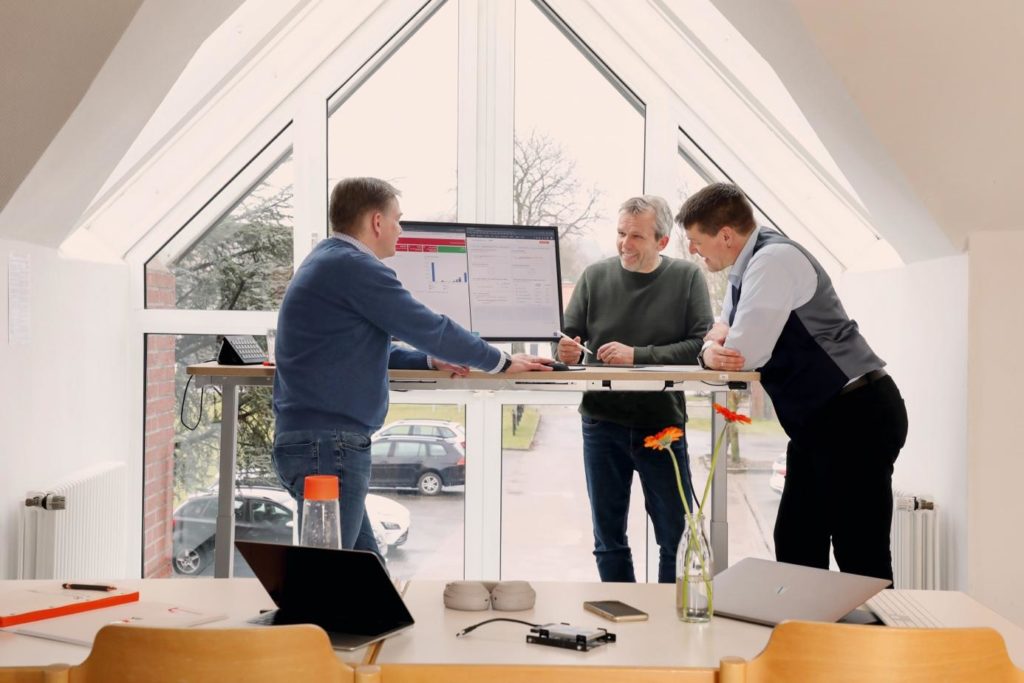E-commerce in the DACH Region: why a Specialized ERP is the gamechanger
Written by
Editorial TeamPublished on

In recent years, the e-commerce market in the DACH region – comprising Germany, Austria, and Switzerland – has experienced remarkable growth. Characterized by a robust economy, high purchasing power, and a tech-savvy population, the region offers a wealth of opportunities for start-ups and established e-commerce companies. However, success in this lucrative but complex market is not without challenges. E-commerce companies have to adapt to a variety of local requirements – from complying with strict legal regulations to meeting different customer expectations.
In such a complex environment, a specialized Enterprise Resource Planning (ERP) system is more than just a practical tool; it is essential for sustainable growth and competitiveness. ERP systems such as Oracle NetSuite’s E-Commerce Suite, Acumatica E-Commerce Suite, and Haufe X360, which is specifically tailored to the DACH region, offer a comprehensive solution for managing various aspects of the business, from supply chain and customer relationship management to finance and human resources.
As if regional challenges were not enough, we also live in what is often referred to as a „VUCA world“ – a world defined by volatility, uncertainty, complexity, and ambiguity. In such a world, the e-commerce landscape is constantly changing, requiring businesses to be flexible and adaptable. And as if that were not enough, the recent rise of remote working or ‚home office‘ culture has added another layer of complexity.
In this article, we look at the particular demands of building and running a successful e-commerce business in the DACH region, the challenges posed by the VUCA world, and how a cloud-based ERP system can make a crucial contribution in this context.
Stay tuned as we unpack these intricate facets and offer actionable insights for founders, e-commerce startups, and established providers looking to make their mark in the DACH region.
The need for a customized ERP system
Success in the e-commerce sector requires a nuanced approach, especially in a market as complex and diverse as the DACH region. Generic ERP systems, while offering a wide range of functionalities, are often unable to meet the specific needs of e-commerce businesses in Germany, Austria, and Switzerland. Below, we explore the key areas where a bespoke ERP system can offer invaluable benefits to businesses looking to establish themselves in the DACH e-commerce landscape.
Firstly, if you are doing business in the DACH region, compliance with local laws and regulations is not only advisable but essential. This includes compliance with the General Data Protection Regulation, consumer protection laws, and country-specific tax laws. A customized ERP system can automatically update itself in response to changes in the law and changing customer requirements, ensuring that your e-commerce business remains legally compliant and up-to-date without the need for manual intervention.

The DACH region, while geographically close, is very different in terms of language and culture. Although German is predominantly spoken, there are different dialects and regional preferences. A specialized ERP system provides multilingual support and its user interface and can adapt customer interactions to the territory, making it easier to provide a localized shopping experience.
Effective supply chain management is central to an excellent customer experience and the success of e-commerce. In the DACH region, this often means working with a mix of local and international suppliers. A customized ERP system will help you manage different aspects of the supply chain, from inventory tracking to order fulfillment, while also taking into account local shipping and logistics aspects.
Payment preferences vary greatly from country to country, even within the DACH region. While credit cards are popular in one area, digital wallets or the Single Euro Payments Area (SEPA) may be the norm in another. Payment practices within a specific market or for a specific target group often differ as well. A specialized ERP system integrates multiple payment gateways and offers the flexibility to serve a variety of local payment methods.
Customer relationships and customer experience are the backbone of a successful e-commerce business. A customized ERP system provides robust CRM capabilities that enable businesses to effectively manage customer data, track buying behavior, and map personalized marketing efforts. This is especially important to adapt to local tastes and expectations in the DACH region.
Adapting your ERP system to these specific requirements is more than just a strategic step; it is essential to successfully navigate the complexities of the DACH e-commerce market. Whether it’s regulatory compliance or providing a localized shopping experience, the right ERP system can serve as a complete solution to meet the diverse demands of this promising, yet challenging market.
How to set up your business with a cloud-based ERP system?
Choosing and implementing a cloud-based ERP system is not a decision you make lightly. It involves a series of steps that require careful planning, evaluation, and execution. Below are the key steps that can guide founders, e-commerce start-ups and established e-commerce providers in the DACH region through the process of setting up their business with a specialized cloud-based ERP system.

Before entering the selection process, it is important to conduct a detailed needs analysis. This often includes a SWOT (strengths, weaknesses, opportunities, threats) assessment to identify the areas where an ERP system can bring the most value to your business. Consider aspects such as financial management, inventory control, customer relationship management, and human resources to determine the scope and functions required.
Once you know exactly what your requirements are, you need to select a vendor that best meets your specific needs. Factors to consider include system adaptability, integration with existing systems, ease of use, scalability, and cost.
Depending on the size of your company and the number of countries in which you offer your products or services, the Oracle NetSuite E-Commerce Suite developed specifically for the DACH market or the Haufe X360 E-Commerce Suite developed on the basis of Acumatica for the DACH market are particularly suitable. Older solutions from Microsoft or SAP should also be included in the selection.
After selecting a provider and an implementation partner, the next major task is to implement the ERP system. It is advisable to draw up a detailed timetable for the project and assign responsibilities for the various tasks to specific team members. Often the partner also offers implementation services, including data migration and system customization. A joint process analysis and close cooperation with the implementation partner ensure that the ERP system meets your company’s requirements.
The introduction of an ERP system is not only a technical undertaking, but also a cultural change within the company. Training is therefore essential for a smooth changeover and acceptance. Depending on the complexity of the system and the needs of the staff, this can range from online tutorials and webinars to face-to-face training.

Once the system is implemented and the team trained, the next step is to go live. It makes sense to do a „soft launch“ in several stages first. This way you ensure that the company benefits from the experience of the initial stages, that the system can be readjusted, and that the company is not overwhelmed by the complexity of the new processes and tools. Once you are sure that the system is stable, it can be rolled out in full. Continuous monitoring and regular updates are crucial to ensure ongoing effectiveness and adaptation to the ever-changing business landscape.
Implementing a cloud-based ERP system tailored specifically to the DACH e-commerce market can seem like a daunting task, but with careful planning and the right tools, it becomes an achievable goal. By following these steps, you will not only streamline your internal operations but also improve your ability to serve your customers effectively, contributing to your overall success in the region.
VUCA World challenges and their relevance
In a fast-paced business environment characterized by constant change and uncertainty, the term „VUCA“ has gained a lot of attention. An acronym for volatility, uncertainty, complexity, and ambiguity, VUCA describes the unpredictable factors that e-commerce companies, especially in a multi-faceted market like the DACH region, have to deal with. Let’s break down each component of the VUCA world and understand how a specialized, cloud-based ERP system can help overcome these challenges.
The e-commerce market is inherently volatile and subject to frequent fluctuations in customer demand, pricing, and competition. In the DACH region, where each country has its own challenges and opportunities, this volatility is amplified. A robust ERP system helps manage this risk by providing real-time data and analytics. This allows companies to quickly adapt to market changes and ensure more stable operations.
Uncertainty in the VUCA world often arises from unexpected regulatory changes, changes in consumer behavior, or unforeseen global events such as pandemics. An ERP system tailored to the DACH market has built-in features to automatically update regulatory compliance, so your e-commerce business can stay flexible and respond to sudden changes.
E-commerce in the DACH region involves a complicated network of variables – multiple payment gateways, different customer expectations, different tax systems, and more. A specialized ERP system streamlines these complex processes and provides integrated solutions that simplify decision-making. By consolidating data and providing actionable insights, businesses can more easily navigate through the complexity.

Ambiguity arises when the outcomes of various actions are unclear, often due to incomplete or conflicting information. In such scenarios, the analytics and predictive modeling capabilities of a robust ERP system can be invaluable. By analyzing historical data and market trends, ERP software helps make informed decisions, reducing ambiguity around various business operations.
Living in a VUCA world requires agility, foresight, and adaptability. For e-commerce businesses that want to succeed in the DACH region, recognizing and preparing for these VUCA challenges is not an option, but a necessity. A cloud-based ERP system tailored to the needs of this unique market serves as an invaluable tool to not only survive but thrive in a VUCA-dominated landscape.
The home office paradigm
The concept of telecommuting or the „home office“ is not new, but its prevalence has accelerated dramatically in recent times, driven by global events and technological advances. For e-commerce companies operating in the DACH region, the home office paradigm brings both challenges and opportunities that can be effectively managed through a specialized ERP system.
The shift to telecommuting means that your team no longer needs to be in a central location. An ERP system can serve as the backbone of your business, streamlining operations and enabling efficient communication between different departments and locations. This allows for a more flexible organizational structure, which is especially useful when it comes to adapting to the different needs and challenges of the DACH region.
When the team works remotely, securing sensitive business data is more challenging, but no less important. A robust cloud-based ERP system has strong security protocols, including end-to-end encryption and two-factor authentication, to ensure that data is safe no matter where your team is. In addition, such systems can also be updated to comply with changing data protection regulations, which is essential in the DACH market.
Setting up home offices requires a new approach to teamwork and collaboration. Cloud-based ERP systems often have integrated project management and communication tools. These features enable real-time collaboration between team members regardless of location and help maintain or even increase productivity levels.

The shift to teleworking has brought the importance of employee well-being to the forefront. ERP systems can include features to track employees‘ working hours, facilitate regular monitoring visits, and even monitor well-being through surveys or feedback mechanisms. This is particularly useful for managing a remote team to ensure employees remain engaged and well-supported.
Finally, moving to a home office can lead to cost savings by reducing the need for physical office space and associated overheads. However, this makes the need for an effective ERP system even more important as it becomes the main tool for managing various aspects of the business, from human resources and finance to inventory and customer relations.
The adoption of the home office paradigm is more than just a trend; it is becoming a permanent change in the way businesses operate. For e-commerce businesses in the DACH region, adapting to this new normal means overcoming challenges around data security, employee collaboration and operational efficiency. A cloud-based, specialized ERP system is critical in addressing these challenges and ensuring that businesses can thrive in this new working environment.
Leading ERP solutions for e-commerce in DACH
When it comes to choosing an ERP solution tailored to the DACH e-commerce market, several options stand out for their robust features, customization options, and scalability. What are the leading ERP solutions for businesses in Germany, Austria, and Switzerland?
The world’s most widely used cloud ERP, Oracle NetSuite, is known for its comprehensive feature set and offers a DACH-localised e-commerce suite designed specifically for complex business needs. It offers support for multiple languages and currencies, making it an excellent choice for businesses operating internationally. Key features include real-time analytics, inventory management, and a highly customizable platform.
The world’s fastest growing cloud ERP Acumatica is known for its flexibility and scalability, making it suitable for both start-ups and established e-commerce companies. Developed for the DACH market, Haufe X360’s e-commerce suite is based on Acumatica, is operated in Germany, and offers seamless integration with various sales channels, comprehensive CRM functions, supports localized payment systems, and includes robust data security features. It also offers powerful analytics tools to help companies adapt to the volatile DACH market.
SAP is a global leader in ERP solutions, and its S/4HANA platform is well-suited for very large e-commerce businesses with complex operations. It offers real-time analytics, machine learning capabilities, and a highly intuitive user interface. Although it was not developed exclusively for the DACH market and is not natively designed to run in the cloud, its extensive customization options allow it to be adapted to local needs.
Known for its user-friendly interface and integration capabilities, Microsoft Dynamics 365 Commerce is another strong candidate. While it offers global functionality and, like S/4HANA, was not designed specifically for the cloud, its customization options allow it to adapt to the specific needs of the DACH market, including local tax regulations and customer behavior analytics.
Choosing the right ERP solution is an important decision that can significantly impact the success of an e-commerce business in the DACH region. From regulatory compliance and local requirements to robust analytics and supply chain management capabilities, these leading ERP solutions provide the tools necessary to not only survive but thrive in this complex and promising market.
Our conclusion
Navigating the e-commerce landscape in the DACH region, which encompasses Germany, Austria and Switzerland, presents a unique set of challenges and opportunities. From complying with various regulatory requirements to adapting to changing consumer behavior, businesses need a robust infrastructure to succeed. In this context, a specialized cloud-based ERP system proves invaluable in streamlining operations, enhancing data security, and enabling effective decision-making.
The VUCA world, characterized by volatility, uncertainty, complexity, and ambiguity, adds another layer of challenges to the mix. Coupled with the increasing prevalence of teleworking, modern businesses need solutions that are not only powerful but also flexible and scalable. Leading ERP solutions such as Oracle NetSuite’s E-Commerce Suite (check NetSuite pricing), Acumatica E-Commerce Suite, and Haufe X360 offer features tailored to the specific needs of the DACH market, including compliance management, real-time analytics, and localization capabilities.
Setting up your business with such an ERP system requires a strategic approach that includes needs analysis, vendor selection, implementation, training, and continuous monitoring. The effort invested in this process pays off in terms of operational efficiency, data-driven insights, and the ability to adapt quickly and effectively to market changes.
In summary, for e-commerce companies looking to succeed in the DACH region, implementing a specialized cloud-based ERP system is not just an operational requirement, but a strategic must. By selecting and implementing the right ERP solution, companies can position themselves advantageously in a competitive market to take advantage of opportunities and minimize risks in an ever-changing landscape.

Solutions mentioned in the text:
About the author

After many years on the board of Haufe-Lexware Real Estate AG, Dirk Forke is now managing director at S+S SoftwarePartner GmbH, the digitalization partner for medium-sized companies. He is very familiar with digital trends and knows how a company gets the best out of its ERP system.
***


